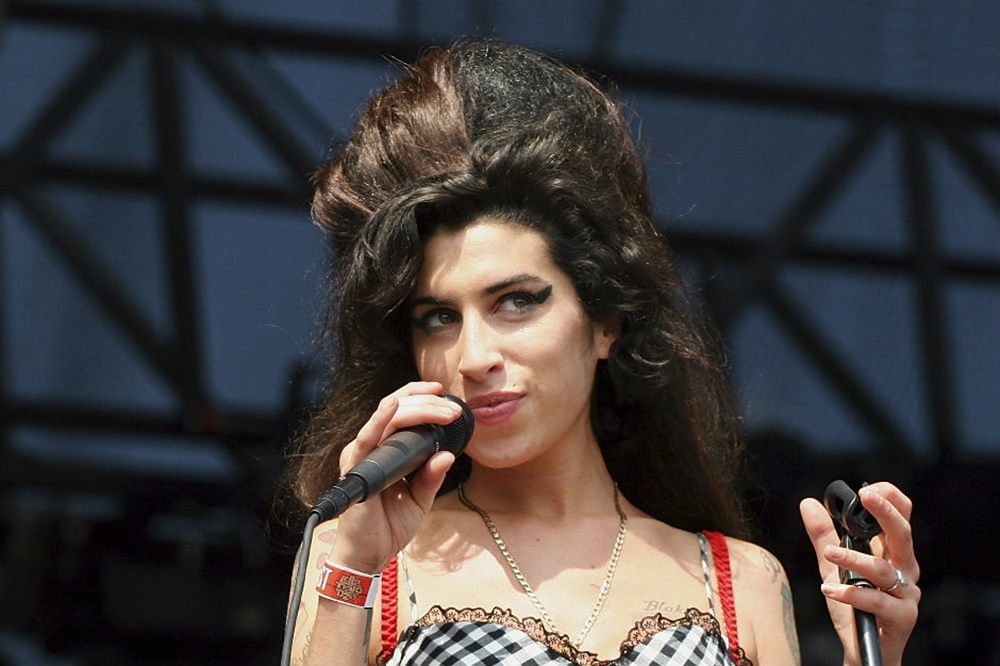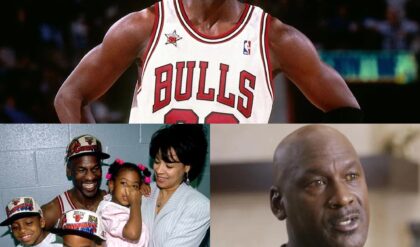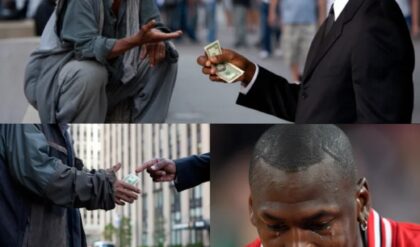Amy Winehouse’s recording career only lasted a decade and produced two albums, but the soulful North London vocalist had an immeasurable impact on popular music. Winehouse became a star in her homeland with the release of her award-winning 2003 debut Frank, boldly reinventing a host of older musical traditions. And with the 2006 follow-up Back to Black, Winehouse became a household name all over the world, breaking through in America with her signature song “Rehab.”

Her legacy has lived on, this week, Winehouse’s story and timeless music come to theaters with the biopic Back to Black, starring Marisa Abela as the late singer. Here’s a look back at ten moments that helped define Winehouse’s life and music.
10. Ms. Winehouse meets Mr. Jones
Queens-born producer Salaam Remi has been quietly ubiquitous throughout hip-hop history, working with everyone from Kurtis Blow and the Fugees to Doja Cat and J. Cole. The two artists he’s made his most significant work with, however, are Nas and Amy Winehouse. Remi produced a significant portion of both of Winehouse’s albums, and a string of Nas hits including “Made You Look” and “I Can.” Remi didn’t introduce the two artists until after Winehouse had already written a song on Back to Black, “Me and Mr. Jones,” about attending a Nas concert and developing a crush on the rapper, who she shared a birthday with. Winehouse actually wrote the Back to Black song “Me and Mr. Jones” about her crush on Nas after attending one of his concerts. Nas and Winehouse only spent one weekend in the studio together, attempting to record a Donny Hathaway song. After her death, however, three posthumous collaborations were released: 2011’s “Like Smoke,” 2012’s Grammy-nominated “Cherry Wine,” and 2019’s “Find My Love.”
9. Her big break with the National Youth Jazz Orchestra
Since its founding in 1965, the National Youth Jazz Orchestra, originally called the London Schools’ Jazz Orchestra, has been a proving ground for some of British jazz’s greatest talents, including Paul Edmonds and Dave O’Higgins. Amy Winehouse, who grew up in North London singing with her father and listening to Sarah Vaughn and Thelonious Monk, joined that lineage with one of her first breaks, becoming a featured singer with the NYJO in 2000. You can hear Winehouse’s gift almost fully formed at just 16 years old on a recording of her singing the Henry Mancini classic “Moon River” with the National Youth Jazz Orchestra. Within two years, she’d be signed to music industry power player Simon Fuller’s 19 Management.
8. Winehouse finds her songwriting voice
Like most jazz singers, Winehouse found her voice by performing age-old standards. Unlike many jazz singers, though, Winehouse quickly grew into a major songwriting talent as well. Manager Nick Shymansky, who’d taken Winehouse under his wing when she was a teenager, remembered encouraging that leap, but later realizing that perhaps he hadn’t needed to. “We’d recorded quite a few demo recordings and I started to talk about whether she’d ever consider writing,” Shymansky said in the 2015 documentary Amy. “She said she’s not sure about writing songs but she’d written a lot of poems. She knew full well she’d been writing songs, but they were very personal songs.” Soon enough, Winehouse began sharing songs she’d written on guitar like “I Heard Love is Blind,” eventually recording them for her debut Frank.
7. The Ivor Novello Awards
Amy Winehouse won many prestigious awards over the course of her brief career, but the first piece of hardware she took home was at the Ivor Novello Awards, which has celebrated achievements in British songwriting since 1955. Winehouse’s 2003 debut Frank received nominations for the Mercury Prize, the BRIT Awards, and the MOBO Awards, but her only pre-Back to Black win was the Ivor for Best Contemporary Song for “Stronger Than Me.” American soul legend Bobby Womack presented Winehouse with the award, which she’d win again three years later for “Rehab.”
6. Winehouse leads a new British invasion
America’s enduring love affair with British pop music began with the Beatles but has waxed and waned over the years. Around the turn of the millennium, transatlantic hits became more scarce, and no British artist topped the Hot 100 from 1999 to 2005. Winehouse’s biggest stateside hit, “Rehab,” was the only song by a British artist to make the top ten of the Hot 100 in 2007. And in its wake, there was an unprecedented flood of female singers from the UK on the American charts, including Adele, Duffy, Estelle, M.I.A. and Leona Lewis.
5. Glastonbury
Since its inception in 1970, the annual Glastonbury Festival has been a rite of passage for virtually every major British recording artist, the crown jewel of the UK’s festival circuit. Winehouse gave one of her greatest live performances at Glastonbury in 2007, on her last tour with backing band The Dap-Kings, who’d played on Back to Black. She returned a year later to perform at Glastonbury in 2008, where she made headlines for disparaging Kanye West onstage.
4. Pouring her pain into Back to Black
Winehouse began dating Blake Fielder-Civil in 2005. And the tumult of their on-again, off-again relationship inspired the most harrowing songs on her blockbuster sophomore album, including “Some Unholy War” and “Back to Black.” Winehouse and Fielder-Civil married in 2007 and divorced in 2009, their lives upended by the massive fame that the album brought her.
3. Winehouse turns a Zutons song into a lost soul classic
During her mid-2000s rise to fame, Winehouse rubbed elbows with rock bands like the Libertines and the Kills while maintaining her distinct mix of jazz and soul. She got to mix those styles together in 2007, however, when Back to Black producer Mark Ronson made his second album Versions, a collection of genre-blurring covers. “Valerie” was a straight-ahead rock song in its original 2006 recording by the Liverpool indie band the Zutons, which became their biggest hit peaking at No. 9 on the UK Singles Chart. Ronson and Winehouse’s version was an homage within an homage, channeling the Motown-inspired arrangement of the Jam’s 1982 hit “Town Called Malice.” Ronson’s “Valerie” charted higher than the original, peaking at No. 2, and remains one of Winehouse’s most enduring performances.
2. Her final duet
Many of Winehouse’s musical heroes were gone long before her time, but legendary jazz balladeer Tony Bennett lived to be 96, carrying the torch for his era as its last remaining star. Bennett recorded two albums of duets with younger stars in 2006 and 2011, and the latter featured Winehouse on a cover of “Body and Soul,” first recorded by Louis Armstrong in 1930. Bennett and Winehouse recorded their duet in March 2011, in what would be her final recording. The single was released two months after her death, on September 14th, what would’ve been her 28th birthday.
1. Winehouse’s big night at the Grammys
Winehouse’s life had become increasingly complicated by addiction and legal problems during Back to Black’s reign on the charts. That created problems for the singer in obtaining a work visa to come to America in February 2008 for the Grammys, where she was up for six awards. Instead, Winehouse and her band stayed in London, where it was 2am when they performed “You Know I’m No Good” and “Rehab” via satellite from Riverside Studios for the Grammys broadcast. She won five of the awards she was nominated for, only the fifth time in Grammy history that a woman had won that many in one night, and Winehouse was starstruck when Tony Bennett presented her with Record of the Year for “Rehab,” celebrating emotionally with her family.

